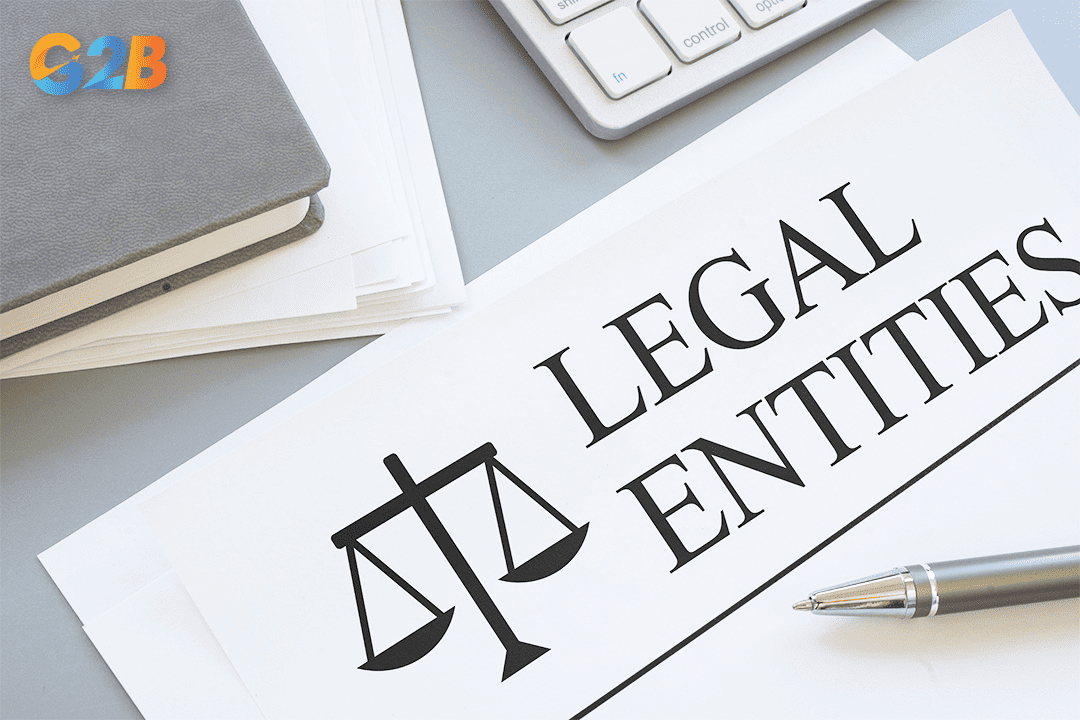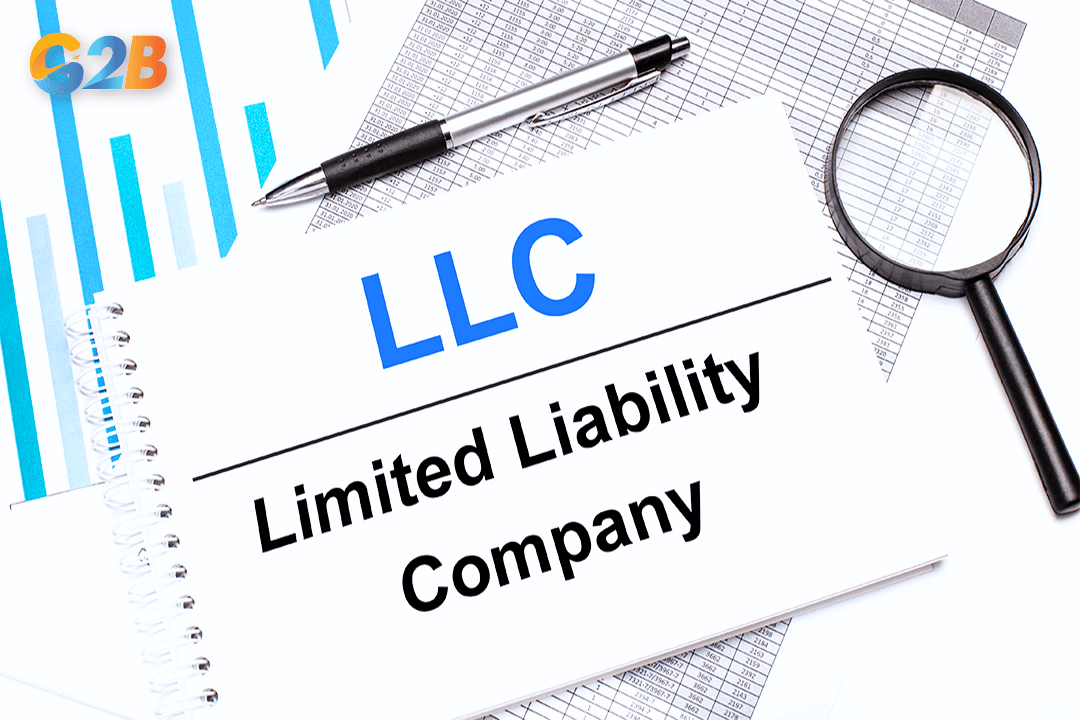A legal entity defines the foundation of a business’s rights, obligations, and long-term viability. However, how can entrepreneurs make the right choice with multiple options, such as sole proprietorships, LLCs, corporations, and partnerships? Let’s go beyond surface-level definitions to explore the nuances of each legal entity, dissect their implications, and provide strategic insights tailored to your business needs in this article.
What is a legal entity?
A legal entity is a distinct organization or structure that has legal rights and obligations. This distinction allows a legal entity to enter contracts, own assets, incur liabilities, pay taxes, and even sue or be sued in a court of law.
Key characteristics of a legal entity
A legal entity possesses several defining attributes that distinguish it from informal business structures. These include:
- Separate legal existence: A legal entity exists independently of its owners. This means the business can own property, hold bank accounts, and enter legal agreements under its own name rather than the name of an individual owner.
- Limited liability protection: Certain legal entities (such as corporations and LLCs) provide liability protection, ensuring that owners and shareholders are not personally responsible for business debts and legal obligations.
- Perpetual succession: Unlike sole proprietorships or general partnerships that may dissolve upon an owner’s death or withdrawal, many legal entities continue to exist regardless of changes in ownership.
- Legal capacity to enter into contracts: A legal entity can independently sign contracts, borrow funds, and engage in transactions that bind the business, separate from its owners.
- Regulatory and tax obligations: Legal entities are subject to compliance requirements such as tax filings, regulatory reporting, and operational disclosures depending on the jurisdiction.

Legal entity possesses several defining attributes to distinguish structures
Why legal entities matter for startups and businesses
Understanding and choosing the right legal entity is a critical decision in business formation. Here’s why legal entities matter:
- Risk management & liability protection: Without a legal entity, business owners bear full personal liability for debts and lawsuits. Structuring as an LLC or corporation shields personal assets from business-related risks.
- Taxation & financial efficiency: Different entities are taxed differently. Sole proprietors and partnerships face pass-through taxation, while corporations are subject to corporate taxes, sometimes leading to double taxation. Understanding these implications helps businesses optimize tax burdens.
- Regulatory compliance & legal standing: Operating as a legal entity ensures the business adheres to local, state, and federal laws, protecting against fines, penalties, and potential lawsuits.
Comparison of common legal entities
| Entity Type | Legal Separation | Liability Protection | Tax Treatment | Common Use Case |
|---|---|---|---|---|
| Sole Proprietorship | No | No | Pass-through | Small businesses, freelancers |
| Partnership | No | Limited for LPs | Pass-through | Professional firms, small businesses |
| LLC | Yes | Yes | Pass-through or Corporate | Startups, small to medium businesses |
| Corporation | Yes | Yes | Corporate Taxation | Large enterprises, VC-backed startups |
| Cooperative | Yes | Yes | Varies | Member-owned businesses |
Types of legal entities and their differences
The legal structure of a business determines liability, taxation, management flexibility, and the ability to raise capital. Let’s explore the key types of legal entities, highlighting their differences and implications.
Sole proprietorship
A sole proprietorship is the most common form of business ownership. It is a business owned and managed by a single individual. The owner is personally responsible for all taxes and debts, as there is no separate corporate entity.
Advantages:
- Ease of formation: Less paperwork and fewer regulations
- Full control: Proprietors can control all aspects of the business
- Tax simplicity: The owner and the business are not legally separate, so the owner keeps all profits and pays taxes personally
Disadvantages:
- Unlimited legal liability: The owner is personally responsible for business debts and obligations.
- Limited available capital: Owners of sole proprietorships can not sell shares or interest in the business to raise money
Sole proprietorship is best for whom?
- Small businesses and entrepreneurs looking for a simple structure.
- Individuals testing a business idea before scaling up.

Sole proprietorship is a business managed by a single individual
Partnership
Partnerships come in different forms, each with varying levels of liability and management involvement. They offer benefits including shared resources and pass-through taxation.
Types of partnerships
- General partnership (GP): Two or more individuals share management duties and liability equally.
- Limited partnership (LP): Includes at least one general partner with full liability and one silent partner with limited liability, who does not manage the business.
- Limited liability partnership (LLP): Provides liability protection for all partners, commonly used by professional firms (e.g., law firms, accounting firms).
Legal responsibilities and risk-sharing
- General partners assume full liability and management control.
- Limited partners contribute capital but do not participate in daily operations.
- LLPs offer liability protection while allowing partners to manage the business.
Pros of partnership:
- Shared financial and managerial resources.
- Pass-through taxation, avoiding double taxation.
- Flexibility in structuring responsibilities and profit-sharing.
Cons of partnership:
- Potential disputes between partners.
- Dissolution complexities if a partner leaves.
Corporation
A corporation is a separate legal entity distinct from its owners. It provides limited liability and perpetual existence.
- C-Corporation (C-Corp): Having an unlimited number of shareholders but required to have a board of directors overseeing key company decisions. They are also subject to double taxation.
- S-Corporation (S-Corp): Having up to 100 shareholders, who include the company's profits, losses, credits, and deductions in their tax filings.
Liability protection and shareholder structure
- Shareholders are only liable up to their investment.
- A board of directors governs corporate activities, while executives manage daily operations.
- Ownership is easily transferable through stock sales.
Tax implications and corporate governance
- C-Corps face double taxation (corporate tax + dividend tax).
- S-Corps avoid double taxation but have strict eligibility requirements.
- Subject to regulatory compliance, including annual reporting and board meetings.

Corporation is a separate legal entity distinct from its owners
Limited liability company (LLC)
An LLC combines the limited liability of corporations with the tax flexibility of partnerships.
Legal obligations and flexibility
- Owners (members) are protected from personal liability
- LLCs allow flexible management structures
- Fewer formalities compared to corporations
How LLCs are taxed
- Pass-through taxation by default, meaning profits and losses flow to members' personal tax returns
- Can elect to be taxed as an S-Corp or C-Corp
- Self-employment tax applies unless structured otherwise
Cooperative
A cooperative (co-op) is a business owned and operated by its members for mutual benefit.
Benefits of cooperatives:
- Democratic governance ensures fair decision-making.
- Profit-sharing among members.
- Tax advantages, as co-ops are often exempt from federal income tax.
Challenges of cooperatives:
- Limited external investment options.
- Slower decision-making due to collective governance.
Nonprofit organization
A nonprofit organization operates for a charitable, educational, religious, or public service mission rather than profit generation. One of the most famous nonprofit organizations in the US is the 501(c)(3) Organizations.
Compliance and tax exemptions
- Donations are tax-deductible, encouraging contributions
- Subject to strict compliance with reporting and operational guidelines
Setting up a nonprofit legally
- File articles of incorporation
- Establish bylaws and a board of directors
- Apply for tax-exempt status
How to choose the right legal entity for your startup
Choosing the right legal entity is a critical decision for any startup. Let’s break down the essential factors to consider and how to align your business goals with the appropriate entity type.
Key factors to consider
When selecting a legal entity, entrepreneurs must consider factors including liability protection, taxation, fundraising potential, and operational control. Each business structure - whether a sole proprietorship, LLC, corporation, or cooperative - affects these aspects differently, influencing risk, growth, and management flexibility.
1. Liability protection
One of the primary reasons entrepreneurs opt for structured legal entities is to protect personal assets from business liabilities. The extent of this protection varies by entity type:
- Sole proprietorship & general partnership: There is no legal distinction between personal and business liabilities, exposing personal assets to risk in the event of business debts or lawsuits.
- Limited liability company (LLC): Owners (members) benefit from limited liability, protecting personal assets from business debts.
- Corporation (C-Corp, S-Corp): Offers the strongest liability protection; shareholders are not personally responsible for business debts.
- Cooperative & nonprofits: Generally provide limited liability for members but have different operational requirements.
2. Taxation structure
Tax implications vary significantly among different legal entities:
| Entity Type | Tax Treatment | Pass-Through Taxation |
|---|---|---|
| Sole Proprietorship | Income taxed at personal rates | OK |
| General Partnership | Income distributed to partners and taxed personally | OK |
| LLC | Default: Pass-through taxation; Can elect corporate tax | OK (default) / NO (if taxed as a corp) |
| C-Corporation | Subject to corporate tax rates; Possible double taxation | NO |
| S-Corporation | Pass-through taxation, but with restrictions | OK |
| Cooperative | Varies by jurisdiction and structure | OK (often) |
For startups expecting rapid growth or seeking venture capital, a C-Corporation is often preferred due to its ability to attract investors and its tax structure that allows stock option incentives.
3. Investment and fundraising potential
Different legal structures affect a startup’s ability to raise capital:
- Sole proprietorship & partnerships: Limited to personal funds or loans; difficult to attract outside investors.
- LLC: More flexibility in ownership structure but less appealing to venture capitalists compared to corporations.
- Corporations: Best suited for equity financing, as they allow for issuing shares and attracting institutional investors.
- Cooperatives: Often self-funded or financed through member contributions.
4. Operational control and flexibility
- Sole proprietorship & Single-member LLCs: Full control by the owner.
- General partnerships: Shared control, which can lead to conflicts if roles are not clearly defined.
- Corporations: Governed by a board of directors, requiring formalized decision-making processes.
- LLCs: Provide flexibility in management structure, allowing either member-managed or manager-managed operations.

LLCs provide flexibility in management structure
Business goals & legal entity selection
Selecting the right legal entity depends on your industry, business model, and long-term growth plans. Different structures offer varying benefits, making it essential to align your choice with your operational and financial goals.
1. Industry-specific considerations
Some industries have standard legal structures due to regulations or investor expectations:
- Tech startups: Typically form C-Corps to attract venture capital.
- Freelancers & consultants: Often operate as Sole Proprietors or LLCs for simplicity.
- Retail & brick-and-mortar businesses: May choose LLCs or S-Corps for liability protection and tax benefits.
- Nonprofits & social enterprises: Must register as cooperatives depending on the mission.
2. Matching business model with entity type
Your revenue model and operational needs should guide your decision:
- Subscription-based models (e.g., SaaS startups): Benefit from C-Corp status for equity distribution.
- Service-based businesses (e.g., agencies, consulting firms): Often structured as LLCs or Sole Proprietorships.
- E-commerce companies: Might prefer LLCs or S-Corps to separate personal and business assets.
3. Long-Term scalability considerations
If you plan to scale internationally, C-Corporations and LLCs provide greater flexibility for cross-border operations, whereas sole proprietorships and partnerships may face limitations due to personal liability exposure. Carefully assess your liability exposure, tax implications, fundraising needs, and operational flexibility before making a decision. Consulting with a business attorney or tax advisor can help ensure you choose the most suitable structure for your long-term goals.
Legal and tax implications of different entities
Each entity type carries distinct legal obligations and tax structures. Let’s dive deeper into the key legal and tax implications of different business entities.
Tax structures for each entity type
While pass-through taxation avoids corporate taxes by taxing profits at the owner’s level, corporations face potential double taxation, making entity selection a key financial decision.
Pass-through taxation vs. corporate taxation
- Pass-through taxation: Profits and losses flow directly to the owners' personal tax returns, avoiding corporate-level tax. Common in sole proprietorships, partnerships, and LLCs.
- Corporate taxation: Corporations are taxed separately from their owners, with potential double taxation on distributed profits (corporate tax + dividend tax).
Double taxation explained
- C-corporations are subject to double taxation: First at the corporate level, then at the individual level when dividends are paid.
- S-corporations and LLCs (if elected) can avoid double taxation through pass-through treatment, where profits are taxed only once on the owners’ tax returns.
Tax advantages and disadvantages by entity type
| Entity Type | Tax Advantages | Tax Disadvantages |
|---|---|---|
| Sole Proprietorship | Simple tax filing (Schedule C on personal tax return) | No tax flexibility, taxed as self-employment income |
| Partnership | Pass-through taxation, ability to split income among partners | Each partner is subject to self-employment tax on their share of profits |
| Corporation (C-corp) | Lower corporate tax rate, better fringe benefits | Double taxation on dividends, complex tax filing |
| S-Corporation | Pass-through taxation, reduced self-employment tax burden | Limited to 100 shareholders, strict operational rules |
| LLC | Flexibility to choose between pass-through or corporate taxation | Self-employment tax applies unless electing corporate tax treatment |
Liability protection and risk management
The right legal entity impacts liability protection and risk management, determining whether personal assets are at stake in business debts or lawsuits. While sole proprietorships and partnerships expose owners to full liability, LLCs and corporations provide limited liability, safeguarding personal finances.
Personal liability vs. business liability
- Sole proprietorships and partnerships: Owners are personally liable for business debts and lawsuits, meaning personal assets (homes, cars, savings) are at risk.
- Corporations and LLCs: Offer limited liability, meaning owners' personal assets are protected from business debts and lawsuits.
How different structures affect personal assets
- Sole proprietorships: No legal distinction between personal and business assets
- General partnerships: Each partner is personally liable for business obligations and actions of other partners
- LLCs & corporations: Owners/members are shielded from personal liability, except in cases of fraud or personal guarantees on business loans
Compliance and reporting requirements
Compliance and reporting requirements vary by business structure, impacting legal obligations and maintenance costs. Sole proprietorships and partnerships have minimal filing requirements, while LLCs and corporations must adhere to stricter regulations, including annual reports, tax filings, and governance documentation.
Annual filings and documentation
- Sole proprietorships: Less paperwork, typically just personal tax filings.
- Partnerships: Must file an informational tax return.
- Corporations (C-corp & S-corp):
- Must file annual reports with state authorities.
- Corporate tax returns.
- Board meetings and shareholder resolutions must be documented
- LLCs:
- Varies by state but typically requires an operating agreement and annual reports.
- Tax filings depend on elected tax treatment.
Legal maintenance costs and obligations
- Sole proprietorships & partnerships: Low-cost maintenance, only requiring tax filings.
- LLCs: Varies by state but generally requires annual fees.
- Corporations: Higher maintenance due to mandatory annual reports, franchise taxes, and compliance with corporate governance laws.
The choice of legal entity has profound implications for taxation, liability, and compliance. Pass-through entities (sole proprietorships, partnerships, S-corps, LLCs) benefit from simplified taxation but may expose owners to greater personal liability. Corporations provide strong liability protection but face double taxation and strict regulatory requirements. Businesses should carefully assess their needs, considering legal protections, tax efficiency, and compliance obligations, and seek professional legal and tax advice before making a decision.

The choice of legal entity has profound implications for taxation
Step-by-step guide to registering a legal entity
This step-by-step guide outlines the process of registering a legal entity, from selecting a business structure to obtaining necessary approvals and compliance.
Choosing a jurisdiction
Selecting the right jurisdiction for your business is a critical first step, as it determines legal requirements, taxation, and operational flexibility. Businesses can register either locally or internationally, depending on their goals and market reach.
Local vs. International registration
- Local registration: Ideal for small businesses and startups targeting a domestic market. It ensures compliance with national laws, simplifies taxation, and allows for easier access to local funding.
- International registration: Suitable for companies engaging in global trade or seeking tax benefits in specific countries. Common jurisdictions for international business registration include Delaware (USA), Singapore, and the British Virgin Islands.
Legal differences by country
Different jurisdictions have unique legal frameworks governing business registration:
- United States: Requires registration at the state level, with varying laws regarding LLCs and corporations.
- United Kingdom: Companies must register with Companies House and comply with the Companies Act 2006.
- Singapore: The Accounting and Corporate Regulatory Authority (ACRA) oversees business registration, offering a streamlined process.
- European Union: Varies by country but follows EU-wide corporate governance standards.
Preparing required documents
To ensure a smooth registration process, businesses must gather all necessary legal documents. Requirements vary based on entity type and jurisdiction but commonly include:
Articles of incorporation & operating agreements
- Articles of incorporation: Define the company’s legal structure, business purpose, and governance framework.
- Operating agreement (for LLCs): Specifies management structure, member roles, and operational guidelines.
- Partnership agreement (for partnerships): Outlines partner responsibilities, profit-sharing, and decision-making processes.
Naming requirements and trademarks
- The business name must be unique and comply with jurisdictional naming conventions.
- Certain terms (e.g., "Bank," "Insurance") may require special approvals.
- Trademark registration is recommended to protect brand identity.
Filing the registration
Once documents are prepared, businesses must submit registration applications through the relevant government authority. The process varies but generally follows these steps:
Where and how to file business formation documents
- Online portals: Many jurisdictions offer digital registration services (e.g., the U.S. Small Business Administration, ACRA in Singapore).
- Physical submission: Some countries require notarized documents to be submitted in person.
- Registered agents: Many international businesses use registered agents to handle compliance and filings.
Government fees and processing times
- Costs range depending on the country and entity type.
- Processing times vary:
- United States: 2-6 weeks (expedited processing available).
- United Kingdom: 24 hours to several days.
- Singapore: May take between 14 days to 2 months
- Offshore jurisdictions: Varies based on regulatory requirements.

Businesses must gather all necessary legal documents to register
Obtaining necessary licenses and permits
After registration, businesses may need additional licenses or permits to operate legally. These vary based on industry and location.
Industry-specific licensing
- Financial services: Banking and investment firms require regulatory approval (e.g., SEC in the U.S., FCA in the UK).
- Healthcare: Clinics and medical practices need health department approvals.
- Retail & ecommerce: Businesses selling regulated goods must obtain special permits.
Ongoing legal compliance
- Annual filings: Many jurisdictions require companies to submit annual reports and renew business licenses.
- Tax registration: Businesses must register for tax IDs (e.g., EIN in the U.S.), VAT, or sales tax.
- Employment regulations: Companies hiring employees must comply with labor laws, including social security and payroll taxes.
Registering a legal entity involves multiple steps, from choosing the right jurisdiction to ensuring compliance with legal and tax obligations. By following this structured approach, businesses can establish a strong legal foundation, avoid regulatory pitfalls, and position themselves for long-term success.
Legal entity and business growth strategy
This section explores how legal entities impact growth and provides strategic insights for business owners seeking sustainable expansion.
Scaling your business under a legal entity
The choice of legal entity impacts a business’s ability to scale, affecting liability protection, taxation, and operational flexibility. While LLCs and corporations support growth by limiting personal risk and offering structured governance, businesses may need to transition entity types as they expand to optimize tax benefits and attract investors.
How entity type affects expansion
- Liability and risk management: Corporations and LLCs provide limited liability protection, making them ideal for businesses planning rapid expansion without exposing owners to excessive financial risk. Sole proprietorships and general partnerships, in contrast, place personal assets at risk.
- Taxation and cash flow considerations: The tax structure of a legal entity affects reinvestment potential. For example:
- Corporations may face double taxation but benefit from lower corporate tax rates on reinvested profits.
- LLCs and S-Corps allow pass-through taxation, helping small businesses optimize tax burdens during early growth phases.
- Partnerships provide flexibility but may complicate tax reporting as business income is passed directly to individual partners.
- Operational flexibility: Some entity types impose rigid structures (e.g., C-Corporations with mandatory board governance), while others (e.g., LLCs) offer more operational freedom, affecting agility in decision-making as businesses scale.
Switching entity types as business evolves
Companies often start as sole proprietorships or partnerships but transition to more complex entities as they grow. Common scenarios include:
- A sole proprietorship incorporating into an LLC or S-Corp to gain liability protection and tax benefits.
- A startup transitioning from an LLC to a C-Corporation to attract venture capital funding.
- A partnership converting into a corporation to facilitate stock issuance and structured equity ownership.
Strategic entity changes should be planned carefully, considering tax implications, compliance requirements, and investor expectations.

Legal entities impact growth and provide strategic insights for business owners
Raising capital and investment considerations
The legal entity of a business significantly impacts its ability to attract investors and secure funding. While C-Corporations are preferred by venture capitalists and institutional investors, sole proprietorships and partnerships face challenges due to personal liability risks and limited access to equity financing.
Investor preferences for different business structures
Different types of investors favor certain legal entities due to liability, governance, and exit strategy concerns:
- Venture capitalists (VCs) and institutional investors prefer C-Corporations due to standardized stock issuance, governance structures, and easier exit strategies.
- Angel investors may invest in LLCs or S-Corporations, but only if the entity allows for flexible ownership structures.
- Banks and traditional lenders often favor corporations and LLCs with established financial records and clear liability protection.
- Crowdfunding models tend to support a range of legal entities, with cooperatives and benefit corporations appealing to socially conscious investors.
Funding challenges for sole proprietors and partnerships
Unincorporated business entities (sole proprietorships and general partnerships) face significant barriers to raising capital:
- Limited access to equity financing: Investors generally avoid sole proprietorships due to personal liability concerns and lack of formal governance structures.
- Difficulty obtaining business loans: Banks often require collateral, and without separation between personal and business assets, borrowing becomes risky.
- No stock issuance options: Unlike corporations, these entities cannot offer shares to attract investors.
Businesses planning to raise capital should consider structuring as an LLC, C-Corp, or S-Corp to maximize funding opportunities.
International business operations
Expanding a business internationally requires careful consideration of legal structures, compliance requirements, and tax implications. Choosing the right entity can help navigate foreign registration laws, protect intellectual property, and optimize tax efficiency through treaties and holding company strategies.
Cross-border legal entity implications
Expanding into international markets requires selecting the appropriate legal structure to navigate regulatory, tax, and operational challenges. Key considerations include:
- Foreign business registration requirements: Many countries require foreign companies to register as a branch office, subsidiary, or joint venture.
- Local compliance obligations: Labor laws, corporate governance, and financial reporting requirements vary significantly across jurisdictions.
- Intellectual property (IP) protection: Certain entity structures facilitate better protection of IP assets in international markets.
For example, a U.S.-based C-Corporation expanding into Europe may establish an EU subsidiary to comply with GDPR data regulations and benefit from EU tax treaties.
Tax treaties and foreign business registration
Tax implications of international expansion depend on bilateral tax treaties and the chosen legal entity structure:
- Double taxation risks: Operating as a foreign branch may expose profits to taxation in both home and host countries unless tax treaties mitigate this.
- Holding company advantages: Many multinational corporations establish holding companies in low-tax jurisdictions (e.g., Ireland, Singapore, Netherlands) to optimize tax efficiency.
- Transfer pricing regulations: Companies with multiple international entities must comply with OECD transfer pricing guidelines to avoid tax penalties.
Strategic planning in entity selection, tax structuring, and compliance is crucial for sustainable international growth. Business owners should align their legal structure with long-term growth objectives, balancing liability protection, tax efficiency, and investor appeal. For companies aiming for global reach, understanding cross-border regulations and leveraging tax treaties will be key to long-term success.

Tax implications of international expansion depend on bilateral tax treaties
Common mistakes to avoid when forming a legal entity
Avoiding pitfalls ensures a strong foundation for sustainable growth. Below are some of the most common errors and how to prevent them.
Selecting the wrong structure
Choosing an inappropriate business structure can have significant consequences on liability, taxation, and operational flexibility.
- Tax implications: Different legal structures are taxed differently. For example, C-corporations face double taxation (corporate tax + shareholder dividends tax), while LLCs offer pass-through taxation. Selecting a structure without tax planning can lead to unnecessary tax burdens.
- Liability risks: A sole proprietorship exposes personal assets to business liabilities, while corporations and LLCs provide limited liability protection. Failing to assess liability exposure can jeopardize personal wealth.
- Operational complexity: Corporations require formalities like board meetings and annual filings, which may not be suitable for small startups. Conversely, sole proprietorships lack scalability. Entrepreneurs should align entity selection with long-term goals.
How to avoid this mistake:
- Consult a business attorney or tax advisor before finalizing your business structure.
- Evaluate your risk exposure and tax obligations for each entity type.
- Consider future expansion plans before committing to a structure.
Ignoring compliance requirements
Failure to meet legal and regulatory requirements can result in fines, lawsuits, and even business dissolution.
- Business licenses & permits: Many industries require specific licenses. Operating without them can lead to legal penalties.
- Annual filings: Corporations and LLCs must file annual reports and maintain good standing with regulatory agencies. Neglecting filings can lead to administrative dissolution.
- Registered agent issues: Many jurisdictions require a registered agent for legal correspondence. Using an unreliable agent can cause missed deadlines and legal consequences.
- Operating agreements & bylaws: LLCs and corporations should have formal agreements outlining ownership, management, and operational procedures. Lack of documentation can cause internal disputes.
How to avoid this mistake:
- Research local and federal compliance requirements before registering.
- Set up reminders for annual reports and tax filings.
- Appoint a reliable registered agent for legal correspondence.
- Draft an operating agreement or corporate bylaws, even if not legally required.

Choosing an inappropriate business structure can have significant consequences on liability
Overlooking future growth needs
Many businesses form entities based on immediate needs, without considering scalability and long-term strategic objectives.
- Difficulty in raising capital: Investors prefer structured entities like C-corporations due to stock issuance flexibility. Choosing a sole proprietorship or partnership may limit funding opportunities.
- Tax burden as revenue grows: While an LLC’s pass-through taxation benefits small businesses, larger profits may make a C-corporation’s tax structure more advantageous.
- Exit strategy considerations: Entrepreneurs planning to sell their business or go public should select an entity that supports mergers, acquisitions, or public offerings.
- International expansion: Some entities, like S-corporations, have restrictions on foreign ownership, limiting global expansion options.
How to avoid this mistake:
- Choose a structure that accommodates future fundraising and investor requirements.
- Regularly review your tax situation to determine if restructuring is beneficial.
- Align entity selection with long-term business goals and exit strategies.
- Ensure your entity type allows for international scalability if needed.
FAQs about legal entities
Understanding legal entities can be complex, and business owners often have common questions about liability, taxation, and compliance. This FAQ section addresses key concerns to help you make informed decisions when choosing the right entity for your business.
1. What is the best legal entity for a startup?
The best legal entity for a startup depends on multiple factors, including liability protection, taxation, scalability, and funding options. Here’s a comparison of common options:
| Legal Entity Type | Liability Protection | Tax Treatment | Suitability for Startups |
|---|---|---|---|
| Sole Proprietorship | No | Personal income tax | Best for solo entrepreneurs testing an idea |
| LLC | Yes | Pass-through taxation (can opt for corporate tax) | Popular choice due to flexibility and liability protection |
| C-Corporation | Yes | Corporate tax, potential double taxation | Preferred for venture capital funding and IPO potential |
| S-Corporation | Yes | Pass-through taxation, ownership restrictions | Suitable for small businesses with fewer shareholders |
For high-growth startups seeking funding, a C-Corporation is often the best option due to its ability to issue stock and attract investors.
2. How do I register my business as a legal entity?
The registration process varies by country and entity type, but the general steps include:
- Choose a Business Name: Ensure availability and compliance with naming laws.
- Select a Business Structure: Decide between an LLC, corporation, or other entity type.
- File Registration Documents: Submit Articles of Incorporation (corporations) or Articles of Organization (LLCs) to the appropriate government agency.
- Obtain an EIN (Employer Identification Number): Required for tax purposes.
- Comply with Licensing and Permits: Some businesses need additional state or industry-specific licenses.
3. What are the tax benefits of forming an LLC?
LLCs offer tax flexibility, allowing owners (members) to choose between:
- Pass-through taxation: Profits and losses pass through to members, avoiding double taxation.
- Corporate taxation: LLCs can elect to be taxed as an S-Corp or C-Corp to optimize tax benefits.
Additional benefits include:
- Ability to deduct business expenses.
- Self-employment tax optimization.
- Potential for state tax advantages, depending on the jurisdiction.
4. Can I change my business entity later?
Yes, but it requires legal and tax considerations. Common transitions include:
- Sole Proprietorship → LLC: Easy conversion to gain liability protection.
- LLC → C-Corp: Often done when seeking venture capital.
- C-Corp → S-Corp: Requires meeting IRS requirements and shareholder limits.
The process typically involves amending legal documents, filing new tax forms, and updating licenses.
5. What is the difference between a sole proprietorship and a corporation?
Key Differences:
- Liability: Sole proprietors are personally liable for business debts, while corporations provide limited liability protection.
- Taxation: Sole proprietors report income on personal tax returns, whereas corporations file separate tax returns.
- Funding: Corporations can issue stock, making them attractive for investors.

Answers for the top FAQs about legal entities
6. What happens if I don’t register my business?
Operating an unregistered business can lead to:
- Legal penalties and fines.
- Limited access to funding and contracts.
- Personal liability for business debts.
- Tax complications and inability to claim deductions.
7. Are there legal risks in choosing the wrong entity type?
Yes, selecting the wrong entity can result in:
- Increased personal liability (e.g., a sole proprietorship exposes personal assets to lawsuits).
- Higher tax burdens (e.g., double taxation in a C-Corp).
- Funding limitations (e.g., investors typically prefer corporations).
8. How do investors evaluate business entities before funding?
Investors assess legal entities based on:
- Scalability: C-Corps are preferred due to stock issuance capabilities.
- Tax efficiency: Investors consider how profits and losses are taxed.
- Liability protection: Ensures personal assets are protected from business risks.
Conclusion
Choosing the right legal entity is a critical decision that shapes your business's liability, taxation, and growth potential. By considering these factors, entrepreneurs can align their business structure with their goals. Each entity type-LLC, corporation, sole proprietorship, or partnership-has distinct advantages and limitations, making it essential to evaluate which best suits their needs.

Choosing the right legal entity is a critical decision that shapes your business's liability
If you are in the process of forming a business or considering restructuring, consulting with legal and financial professionals can help you avoid costly mistakes and optimize your setup. For deeper insights, explore our related guides on business registration, tax strategies, and compliance essentials to make well-informed decisions.
Need expert guidance on company formation? Contact G2B today to receive comprehensive consulting about company formation in Delaware and based on your situation! Let G2B be your trusted partner, guiding you through every stage of business registration with reliability and dedication.


 Delaware (USA)
Delaware (USA)  Vietnam
Vietnam  Singapore
Singapore  Hong Kong
Hong Kong  United Kingdom
United Kingdom 
